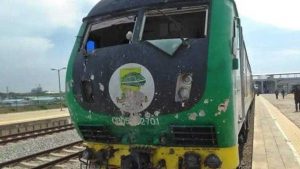Threats From Kidnappers And Vandals Affect The $4.12 Billion In Railway Infrastructure
 Following the kidnapping of 20 train passengers last Saturday at the Tom Ikimi/Ekehen Station in Igueben, Edo State, as well as recent incidents of vandalism against rail infrastructure nationwide, Nigerians are starting to voice concerns about the $4.12 billion that the current administration has already spent on the modernization of the country’s railway system.
Following the kidnapping of 20 train passengers last Saturday at the Tom Ikimi/Ekehen Station in Igueben, Edo State, as well as recent incidents of vandalism against rail infrastructure nationwide, Nigerians are starting to voice concerns about the $4.12 billion that the current administration has already spent on the modernization of the country’s railway system.
According to a breakdown of the investment, $2.5 billion went into building the standard gauge rail line between Lagos and Ibadan, $1.5 billion went into building the line between Abuja and Kaduna, and $121 million went into restoring the standard gauge between Warri and Itakpe.
The Federal Government obtained a loan from China for the purpose of purchasing the rolling equipment, which includes the locomotives and carriages, for $4.12 billion, The Guardian has learned.
With the purpose of repaying the loans with the venture’s profits, the China Exim Bank provided loans for more than 70% of the investment in the railway system. Nigerians are worried about the nation’s capacity to uphold the loan’s conditions in the face of the difficulties facing the industry.
The 25-year Strategic Railway Master Plan is being forcefully pursued by the present government, according to President Muhammadu Buhari.
The government, according to him, would concentrate on coastal rail, such as the Lagos-Calabar standard gauge rail line with branches to Benin, Agbor, and Onitsha, the Port Harcourt-Maiduguri standard gauge rail line with branches to Owerri, Awka, Abakaliki, Yola, and Damaturu, and the Kano-Kazure, Daura, Kastina, and Jibya to link to Maradi in the Niger Republic.
The projects were vigorously pushed by the former minister of transportation, Rotimi Amaechi, but were dragged down by a shortage of funding and Nigerians’ concerns that borrowing money from China may jeopardize Nigeria’s sovereignty.
Recent changes in the industry, however, have demonstrated that even government projects already completed are in danger as more Nigerians lose interest in using rail services due to an increase in terrorist assaults and vandalism, as well as inadequate security measures.
On March 28, 2022, a bomb detonated on the rails, causing a passenger train traveling between Abuja and Kaduna with more than 400 people on board to derrail. About nine people were killed as a result of this, 62 passengers were abducted, and many more were shot. Many of the victims, who were held captive for eight months, as well as their loved ones, are still reeling from the trauma.



